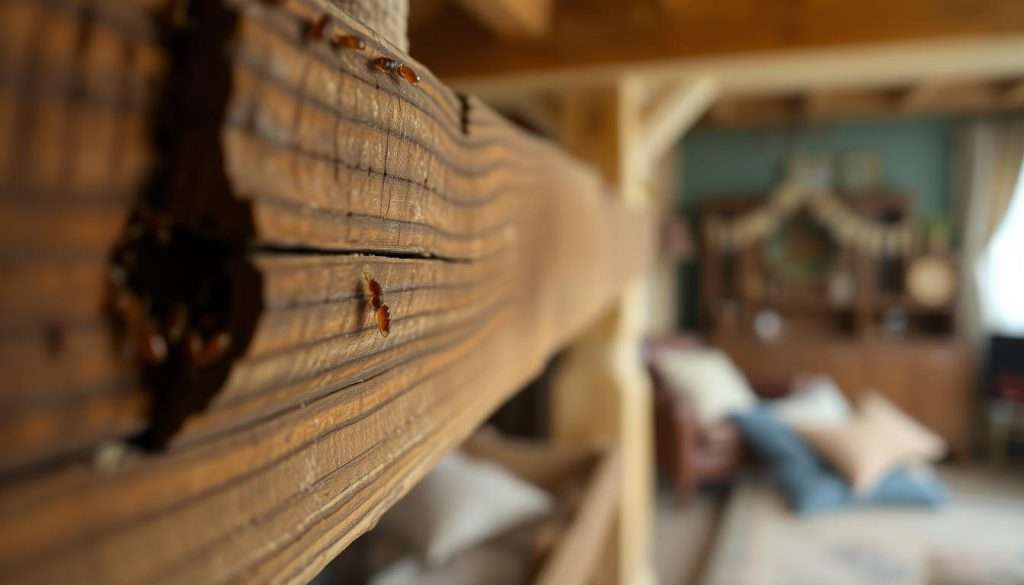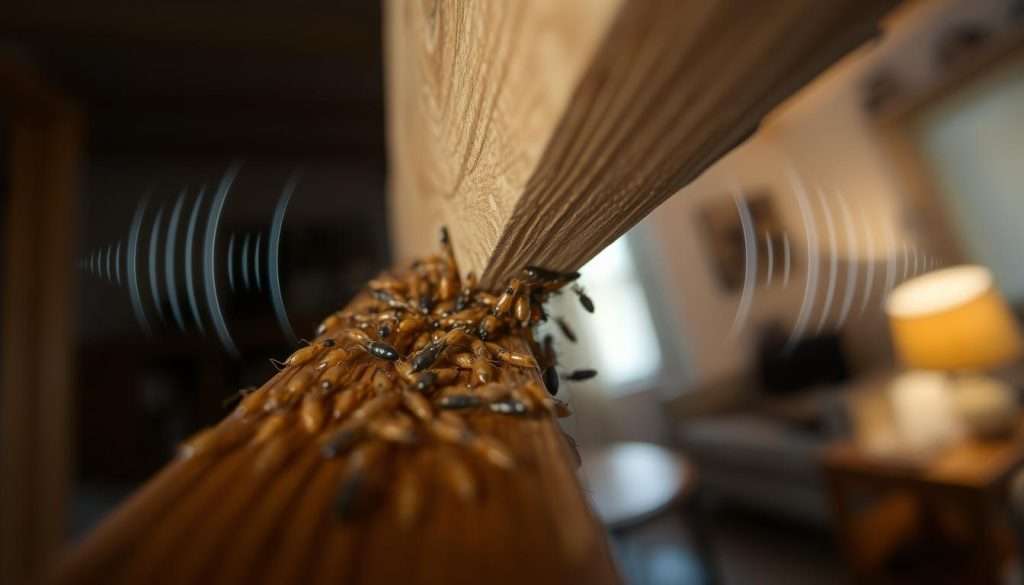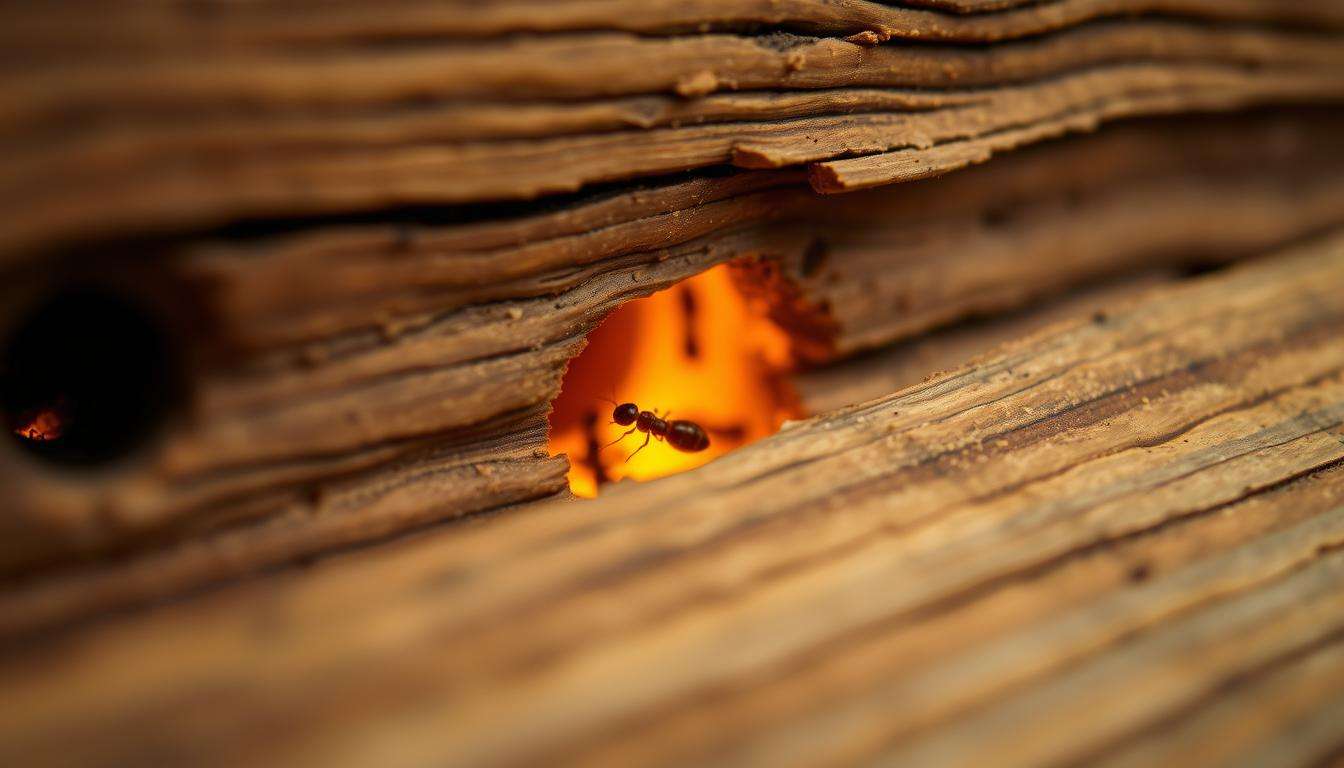Knowing what termites sound like is key for homeowners to protect their homes. These pests can be sneaky, but their sounds can warn us of trouble. So, what do termites sound like? They make sounds like clicking, buzzing, and chewing.
By learning these sounds, you can help keep your home safe from damage. Remember, termites are always active and don’t sleep. This means their sounds are louder at night. If you hear tapping or rustling in your walls, it might mean termites are there.
Being alert to termite sounds helps you act fast. Knowing these sounds, like head-banging or chewing, lets you tackle problems early. Paying attention to these signs is the first step to a healthy, sound home.
Key Takeaways
- Termites produce noises recognizable to humans as a means of communication.
- Distinct noises include clicking, buzzing, head-banging, and chewing.
- Awareness of these sounds, especially at night, is vital for early detection.
- Clicking sounds are typically made by soldier termites to communicate danger.
- Chewing noises indicate feeding, creating visible damage to wood.
- Pest control measures can effectively handle infestations once detected.
- Understanding these signs can save homeowners from costly repairs.
Understanding Termite Sounds
Knowing what termites sound like helps spot infestations early. Termites make different sounds, and knowing these can alert you to problems at home. Often, termite noises in walls show up before you see them. By listening, you can tell when termites are active or if there’s a big issue.
Identify Common Noises Made by Termites
Here are some common termite sounds:
- Clicking and tapping: Soldier termites make a quick clicking sound by hitting their heads on wood. This warns the colony of danger.
- Rustling sounds: Worker termites make a constant rustling as they eat wood. It sounds like scratching.
- Head-banging: Different species bang their heads in different ways. For example, Reticulitermes soldiers bang in groups of 3-4, while Formosan subterranean termite soldiers bang consistently.
- Wing fluttering: Flying termites make flapping sounds when they swarm to find new homes.
How Termites Communicate Through Sounds
Termites live in groups and use sounds to talk to each other. For example, soldier termites make loud noises to warn the termite colony sounds of danger. These sounds help them work together and warn of threats. Termites might make their sounds louder at night or in damp places, making them easier to hear.

Listen for these sounds in quiet rooms or near wood. Paying attention to termite noises in walls can help you find them before damage shows. For more on finding termites by sound, see this guide here.
What Do Termites Sound Like
Termites make different sounds that can alert you to their presence. They click, rattle, and chew, making various noises. These sounds can help you spot and deal with infestations early.
Clicking and Rattling Noises Explained
The termite clicking noise is a key sound to know. Soldier termites click their heads against wood to warn others. This is how they talk to each other.
They also buzz like bees, but it’s not as clear. You might hear tapping in walls as they chew and tunnel. This is most noticeable at night when they’re most active.
Feeding Sounds: Chewing and Gnawing
Termite feeding sounds are important to recognize. The termite chewing sounds are soft crunches as they eat wood. This can damage your home’s structure.
Listen for these sounds, especially at night. If you hear them, get help right away. This can prevent serious damage to your home.

| Termite Activity | Associated Sounds | Time of Day |
|---|---|---|
| Head-banging | Clicking noise | Nighttime |
| Feeding | Crunching and gnawing sounds | Continuous |
| Tunneling | Tapping sounds | Nighttime |
| Swarming | Faint buzzing sound | Spring |
Signs of Termite Infestation
Spotting termite infestations early can save you from expensive fixes. One key sign is termite noises in walls. These sounds might be hard to notice but are very important. It’s crucial to listen for these noises and look for other signs too.
Identifying Termite Noises in Walls
Termite noises sound like tapping or clicking from inside your walls. These sounds mean termites are eating wood in your home. Listen for odd sounds when it’s quiet. If you hear termite noises in walls often, it could mean termites are growing in number.
The Importance of Droppings and Frass
Termite droppings, or frass, are another big sign. These small, dark pellets show up under infested spots. They mean termites are eating wood in your home. Checking for these droppings regularly can show how bad the problem is.
Physical Signs: The Tap Test
The tap test is a simple way to check your wood. Tap on the wood and listen. A dull sound might mean the wood is damaged and has termites. Spotting these signs and termite knocking noises early can help stop big problems.
| Sign of Infestation | Description |
|---|---|
| Termite Noises in Walls | Distinct sounds indicating active feeding within wood structures. |
| Termite Droppings | Small, dark pellets found near infested areas, signaling termite activity. |
| Tap Test | A method to assess wood integrity by knocking and listening for sound differences. |
Listening for termite noises in walls, looking for droppings, and doing the tap test are key steps. If you think you have termites, act fast to protect your home. For more on termite signs, check out this guide.
When to Seek Professional Help
Knowing when to act is key to stopping termite damage. Termite noises are a warning you can’t ignore. If you hear soft clicking or buzzing at home, act fast.
Recognizing the Urgency of Termite Noises
It’s crucial for homeowners to know termite sounds. These sounds mean termites are active. Look out for:
- Clicking sounds from worker termites.
- Banging or rattling in infested wood.
- Somber buzzing, especially at night.
If you hear these sounds often, act fast. Termites can damage homes, costing thousands to fix. Spotting these signs early saves time and money, so stay alert.
Knowing When to Call Pest Control
Homeowners should know when to call pest control. Notice termite noises or signs like:
- Discarded wings near windows or doors.
- Mud tubes on walls.
- Frass in corners or near wood.
Don’t wait to call experts like Bug Out for free quotes. Getting help early stops damage and gives peace of mind. Remember, acting fast on termites prevents big repairs later.
Conclusion
Knowing what termites sound like is key to keeping your home safe. Termites make sounds like clicking, buzzing, and soft tapping. These sounds can warn you of an infestation early on.
Termites can damage your home without you even noticing for months. They work all day and night, making sounds more noticeable at night. Sounds like soldiers banging their heads or soft vibrations while feeding are important clues. Keep an eye out for these signs to keep your home safe.
If you hear termite sounds, act fast. Getting help from experts is important. Early action can save your home’s value and keep your family safe from termites.
